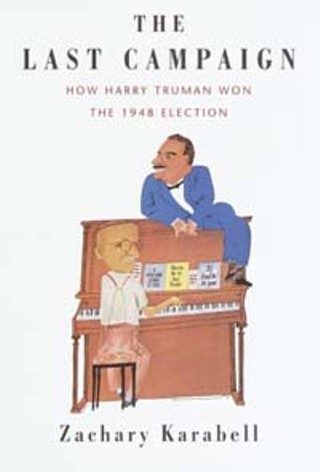The Last Campaign: How Harry Truman Won the 1948 Election
Reviewed by Bruce McCandless, Fri., May 12, 2000

The Last Campaign: How Harry Truman Won the 1948 Election
by Zachary KarabellKnopf, 320 pp., $27.50
The central paradox of Zachary Karabell's engaging new book, The Last Campaign: How Harry Truman Won the 1948 Election, is the fact that we never really do learn how Truman accomplished his remarkable electoral feat, which continues to fascinate and occasionally haunt historians, candidates, and political operatives to this day.
From start to finish, the first postwar presidential election seemed sure to mean the end of the administration Harry Truman inherited upon the death of Franklin Delano Roosevelt. Early on, the Democratic party found itself being drained of traditional, if somewhat marginal, constituents by not one but two rival political camps. On one side, Henry Wallace's Progressives, featuring musical guests Woody Guthrie and Paul Robeson, agitated for peace, love, and an end to Wall Street's financial stranglehold on matters of national policy. On the other, a brand-new States' Rights (read: anti-black) Party, founded by some of the South's brightest young bigots, worked to derail Truman's civil rights initiatives. It's worth the price of admission just to see a middle-aged but obviously spry Strom Thurmond grinning up from these pages as the Dixiecrat nominee for President of the United States.
Waiting in the wings, meanwhile, stood Republican nominee Thomas Dewey, a celebrated Gotham City mob-buster and gentleman farmer who seemed likely to provide a bright contrast to the allegations of croneyism and machine politics that always dogged Truman. Republicans salivated at the prospect of regaining the big house they'd lost through the vacillations of Herbert Hoover some 16 years and an entire social revolution earlier.
Karabell does a masterful job of illustrating how Dewey, who in contemporary photographs seems somehow to resemble both Clark Gable and Alfred E. Newman, ran a lofty campaign that seldom bothered to touch the earth. In what has become known as a classic front-runner's strategy, he rarely mentioned the sitting president and avoided speaking in specifics whenever possible. Running behind Dewey in every important poll, Truman was forced to attack. Because Dewey himself was a perfectly decent if somewhat vacuous character, Truman lit into Republicans generally, characterizing them as enemies of the farmer and working man who controlled a "do-nothing" Congress.
As anyone who's ever seen the classic photograph of Truman brandishing the DEWEY BEATS TRUMAN edition of the Chicago Daily Tribune can attest, a funny thing happened on the way to the inauguration. Exactly what is unclear. Did Truman, through the agency of a carefully wrought whistle-stop campaign and a series of increasingly vituperative, stand-up-and-fight-like-a-man stemwinders, really manage to change the mind of a nation? Or were the statistical "experts" who consistently showed the American electorate to be dead-set against the man from Independence simply wrong all along?
Karabell may not furnish the answers, but it's plain to see he loves the questions. So should we. They point up the fact that once upon a time in the not-so-distant past, the United States electorate somehow or other managed to fool almost everyone in a position of analytical authority. In an age where somebody somewhere always seems to know what we think, this may be the most hopeful lesson to emerge from the entire affair








